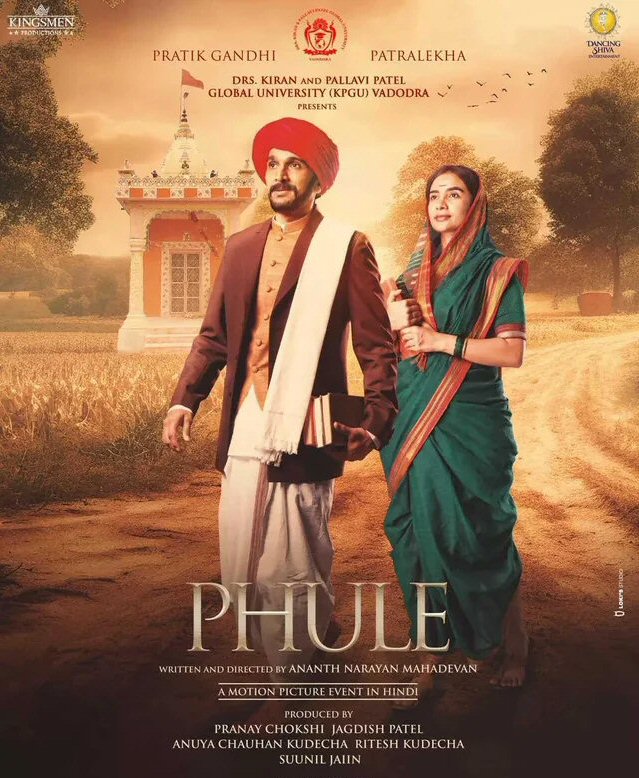Phule: A Daring Depiction of Revolutionary Spirit Stumbles in Execution
If you thought the cinematic landscape was bold enough to tackle social reform, Phule opens up a familiar yet controversial dialogue on how true narratives can sometimes falter under the weight of execution. This movie teeters between powerful subject matter and execution shortcomings, ultimately leaving audiences with mixed emotions.
Phule Overview: A Synopsis of Struggle and Growth
With a rating of 2.0/5, Phule, directed by Ananth Narayan Mahadevan, tells the story of social reformer Jyotiba Phule, portrayed by Pratik Gandhi, and his equally impactful wife, Savitri, played by Patralekhaa. Set in the 1840s, this poignant tale touches upon the injustices faced by lower castes and the groundbreaking decision to educate girls at a time when such ideas were revolutionary.
In a society resistant to change, the film dives deep into the caste struggles and the determination of Jyotiba to challenge accepted norms, depicting both the light of hope and the dark shadows of oppression.
Star Cast:
- Pratik Gandhi as Jyotiba Phule
- Patralekhaa as Savitri Phule
- Vinay Pathak as Govindrao Phule
- Sushil Pandey as Raja Ram Phule
Mixed Results in Storytelling: The Highs and Lows
Phule attempts to articulate a powerful narrative about education and equality but stumbles with its screenplay, a collaborative effort from Ananth Narayan Mahadevan and Muazzam Beg. Although some impactful scenes surface, too many critical moments fail to resonate, diminishing their intended power. You need sharp dialogue and clarity of purpose in biopics to gain that emotional pull, but Phule falters in execution. Tidbits of inspiration shine (“Vishnupant’s support,” “school for girls”), yet the overall structure dilutes their significance.
Trade-Offs and Challenges: The film delivers glimpses of Jyotiba’s court struggles and his brave resolutions against societal norms, yet these scenes don’t bind the story into a compelling arc. They become isolated moments, creating a disconnect with the viewer rather than a cohesive narrative.
Direction: An Opportunity Missed
Ananth Narayan Mahadevan’s direction showcases glimpses of what could have been but ultimately leaves the film feeling flat. There’s an undeniable importance to the historical backdrop and the relevance of Jyotiba Phule’s legacy, yet the climax and essence of the movie seem rushed, leading to an episodic feel that diminishes the journey of both Jyotiba and Savitri.
For context, renowned directors often infuse their narratives with deeper emotional stakes—take Selma for instance, which effectively illustrates the civil rights movement through artful storytelling. Mahadevan’s vision feels hampered by a lack of focus, failing to maintain sustained tension or growth arcs.
Musical Offerings: A Forgettable Soundtrack
As for the music by Rohan-Rohan, it does little to elevate the film. The tracks, including “Saathi,” fall flat, lacking the memorable hooks that stay with audiences post-viewing. While a catchy tune can become a cultural touchstone, the soundtrack here doesn’t offer that. It’s telling, especially when juxtaposed with historical musical scores that effectively encapsulate the era and sentiments, like those seen in Lagaan and Gandhi.
Performances Shine Amid Shadows
Despite the narrative weaknesses, Pratik Gandhi undoubtedly delivers an impressive performance, towering above the script’s limitations. He’s adept at portraying the evolution of Jyotiba, drawing subtle distinctions in body language as the character ages. Patralekhaa, while occasionally overshadowed, manages to find her moments and presents a commendable performance.
The supporting cast features compelling characters that enrich the narrative, yet some, like Vinay Pathak and Joy Sengupta, risk being relegated to recycled tropes that don’t add substantive value to the storyline.
Technical Aspects: A Crafting of Historical Resonance
Sunita Radia brings her skills to the forefront with competent cinematography that captures the essence of the bygone era. However, the editing by Rounak Phadnis could have approached a more polished final cut to improve narrative flow.
Comparative Analysis of the Technical Elements in Phule:
| Aspect | Phule | Successful Biopics |
|---|---|---|
| Cinematography | Well-shot, lacks flair | Visually captivating |
| Editing | Could use more finesse | Tight, engaging pacing |
| Music | Unmemorable | Iconic, emotionally resonant |
| Direction | Flawed, lacks cohesion | Strong vision, focused narrative |
Conclusion: A Lost Opportunity in Storytelling
Ultimately, Phule is a story charged with potential, a narrative ripe with revolutionary zeal that struggles to articulate its message effectively. While Pratik Gandhi’s performance shines, the film’s lackluster script and uninspiring direction render it a forgettable entry in the realm of biopics.
With the film poised to go unnoticed at the box office, it exemplifies the challenges filmmakers face when balancing importance with execution. In an industry that often celebrates groundbreaking narratives, Phule serves as a reminder that even the most inspiring stories need robust storytelling to truly resonate. For an in-depth discussion on musical influences in modern biopics, check out our feature on how cultural soundtracks shape narratives here.
If you’re wondering how Phule fits within the broader framework of meaningful cinema, read more about how emotions are intricately linked to storytelling success in films, available in our recent discussion. And don’t miss our take on the varying standards of film production with insights into how societal standards influence movies in this analysis.

